— June 13, 2019
Every business owner knows having a recognizable business title is a major attributing factor when it comes to the growth and success of your small business. In fact, your business title will determine whether or not your business can be easily found online.
Even though you may have an easily searchable business title for direct traffic, content is what will drive the rest of your customers to your business. If you can create useful content, you’ll bring in more traffic and more potential customers. Now, the tricky part is writing a title for search engine optimization (SEO).
Below, we share some useful tips for writing effective SEO titles Google, and your readers, will love.

Google Search Ranking Signals
Google uses ranking signals to determine in what order its search engine results appear. There are hundreds of ranking signals and their importance change with every update. As there are multiple, small updates to Google’s search algorithm every single day, SEO experts tend to only focus their attention on major updates, as too should you.
In its latest search algorithm update, on March 12, 2019, Google announced changes to its Broad Core Algorithm. The details of the changes made are still not made public; however, most speculate the changes were made in order to better serve user satisfaction. This means Google is looking to see how well your search result answers a particular search query.
If that’s the case, which many experts believe it to be, the first place to begin improving user search satisfaction is with your title.
Understand User Search Intent
In order to understand user search intent, you have to know why people search online in the first place.
Online searches can be grouped into three categories such as transactional “Do,” Informative “Know,” and Navigational “Go” queries. For all information regarding queries, check out our Digital Marketing: Keyword Research 101 blog post.
All of the above search categories correspond to a level in your sales funnel, where informative searches are top of funnel and transactional and navigational searches comprise bottom of funnel.
Each funnel will have types and topics of content that perform best to incentivize users to complete an action or engage with your content. Content pages using the best performing topics and structures, at their respective stage in the funnel, matching a query will be ranked higher in search because Google believes users who interact with your content are satisfied. In turn, the type and topic of content will inform the title as well.
For example, if the query is informative in nature, its aim will be to qualify customers to enter deeper into your funnel through providing more detail around a topic where you also provide a product or service. As is, E-books are effective forms of content for engaging users when they conduct informative based searches. This means you should include an E-book on your new content page, presumably in exchange for an email. As this type of content play will be the draw for your page, you’ll then know to include the word “E-book” and the topic it covers in your title.
Create a Title Your Audience is Searching For

Always remember the results of your users’ search queries come with a direct effect on how your meta titles will appear within Google.
When keywords within a user search query matches with your title, Google will rank your website higher on various search results and will also bold the matching phrases and words in your meta title.
This means that in order to greatly benefit from these matching title results, you will need to make a great effort to create your title based on what the potential customers will likely be looking for.
With Google Keyword Planner, you can fine-tune your SEO titles to match perfectly what your targeted audience is searching for.
To find keywords and keyword phrase combination ideas to best match with user searches, create a free Google Keyword Planner account. After you’ve set-up your free account, click on the left box, “Discover new Keywords” to find new keyword ideas.
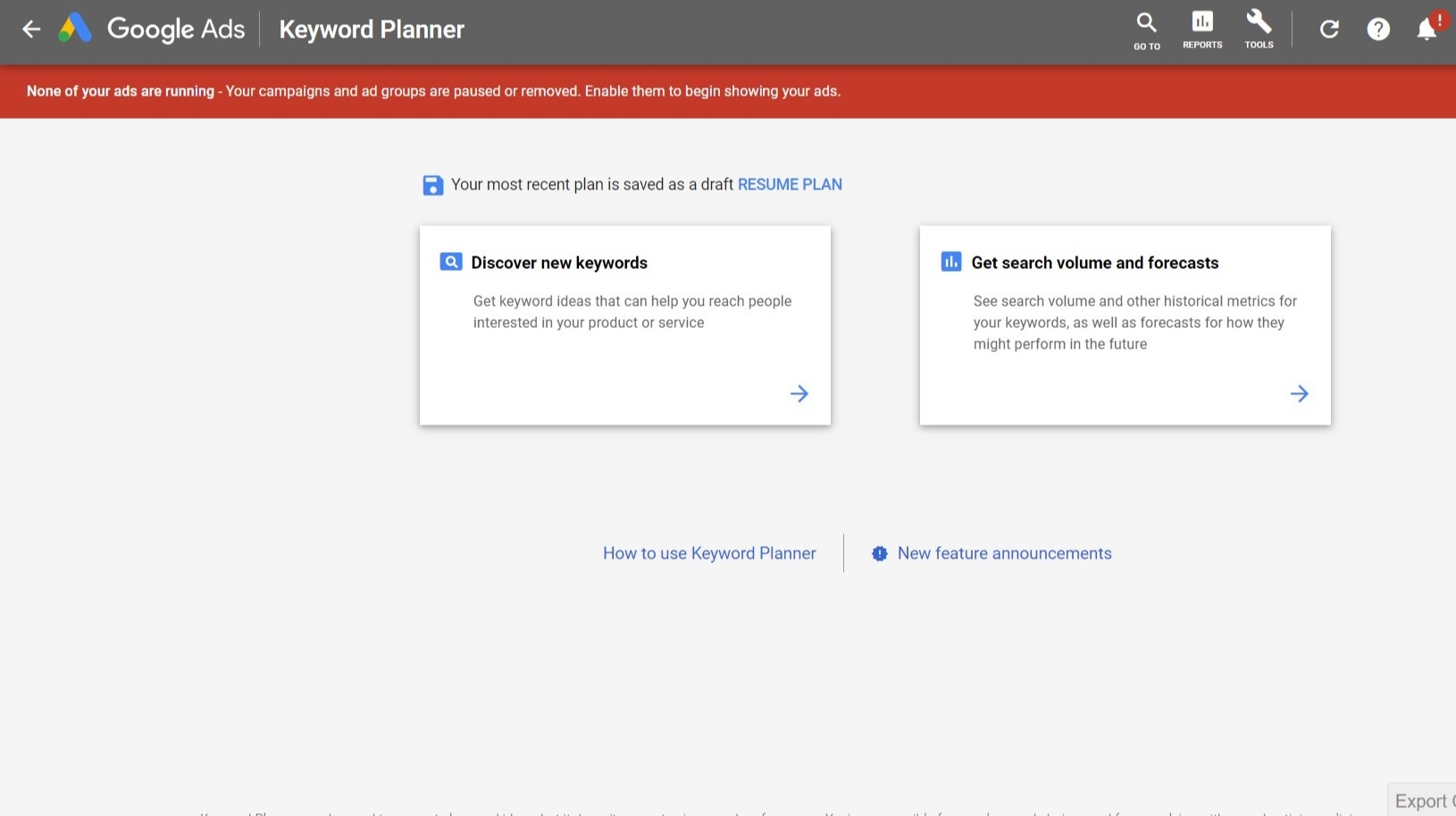
Type in a keyword or keyword phrase relating your business. For this example, we’re going to use, “paint store.”
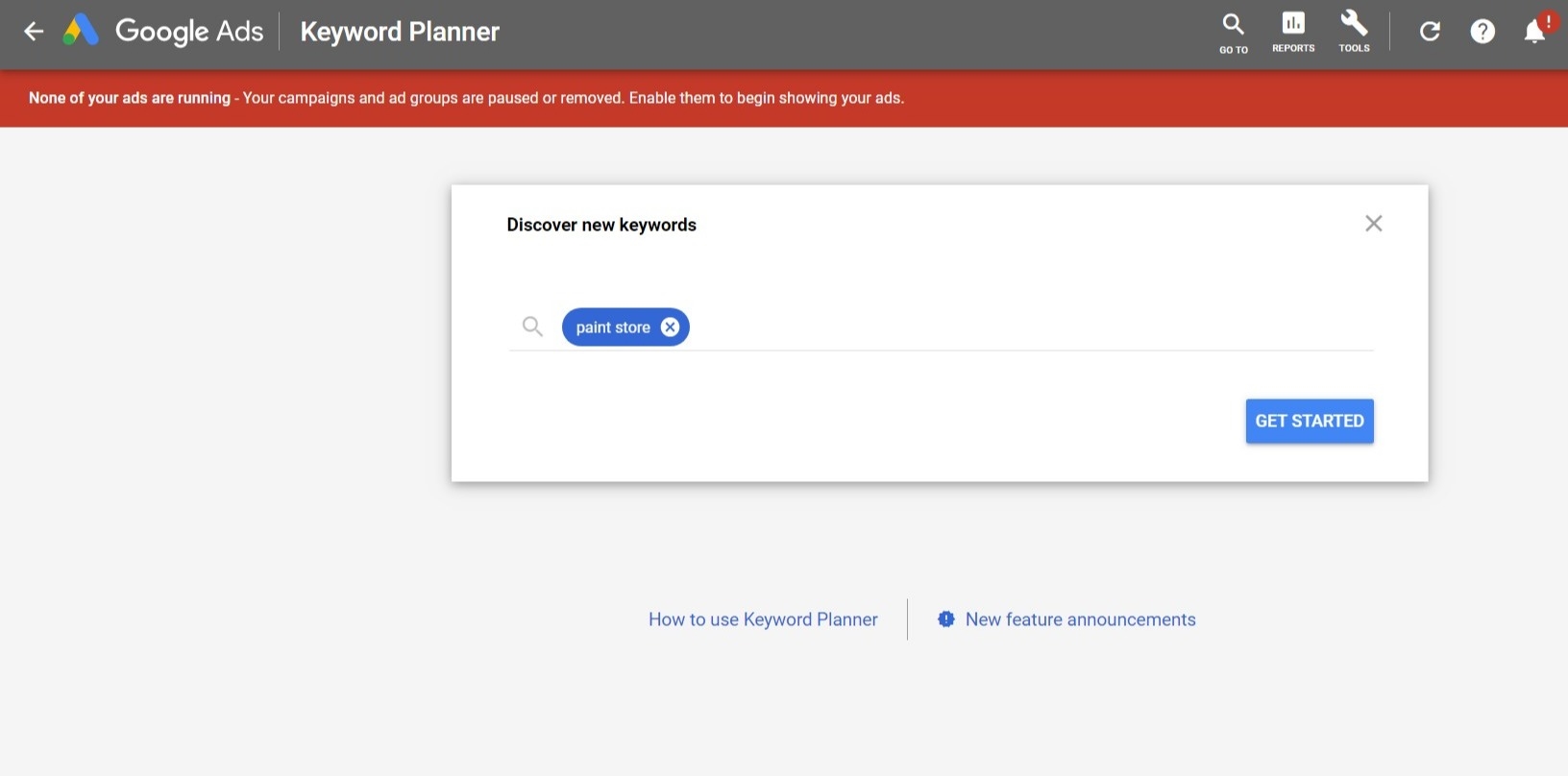
As an alternative to entering a keyword, you can enter the domain page of one of your competitors to see which keywords they rank for. All you have to do is copy their home page URL and paste it into the search bar, click entire site (unless you want to examine keywords on a certain page) and click the “Get Started” button.
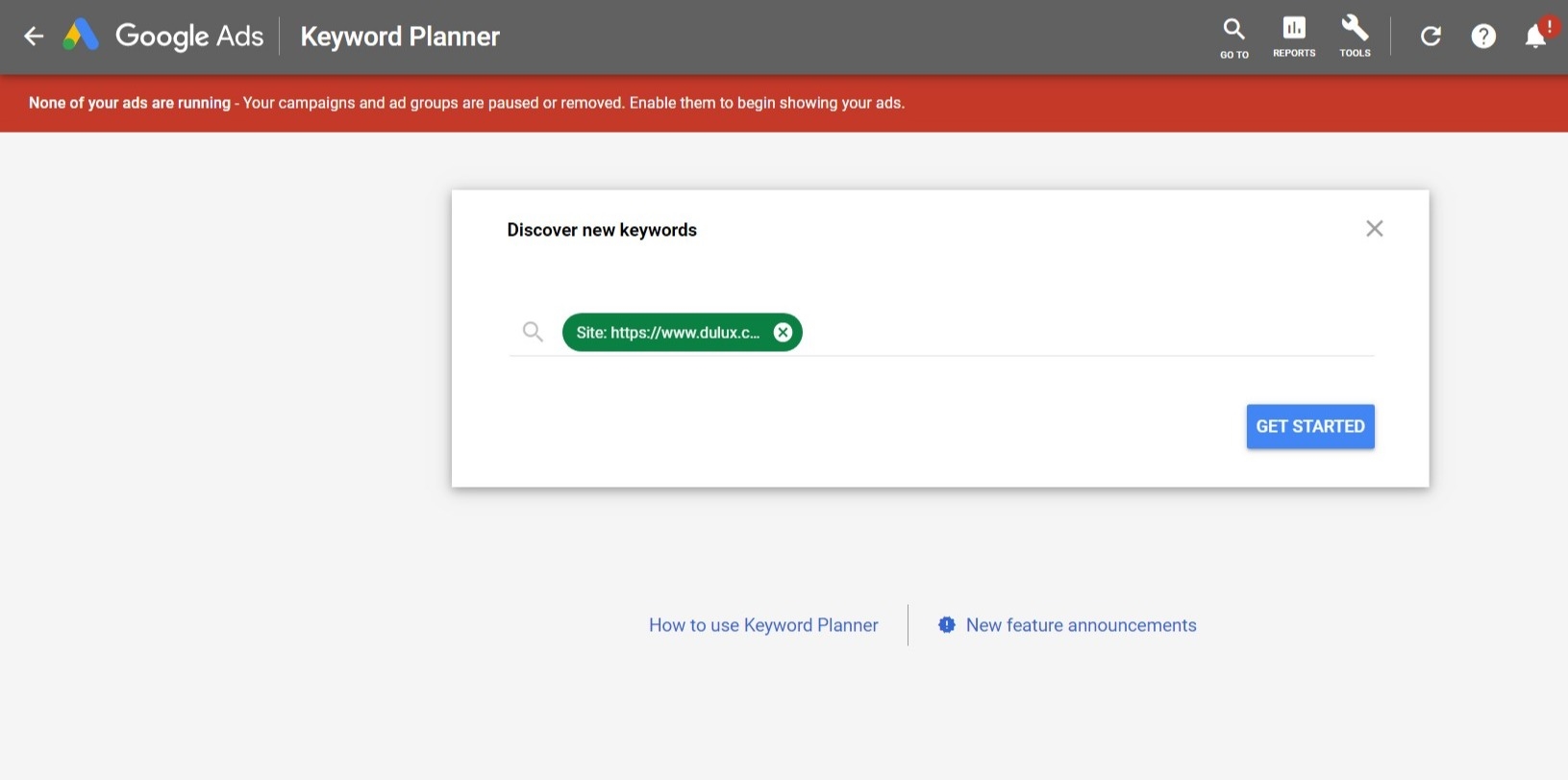
You’ll see both branded and non-branded keywords populate. Since you’re company won’t share the same name as your competition, you’ll be looking to see which non-branded keywords they’re using to drive traffic to their website. Pay particular attention to any keywords denoting specialized forms of products, as it’s here where you can find ideas to separate yourself from your competition.
Also, don’t ignore branded keywords entirely. They can be a great way of understanding what branded search terms your business can steal from your competition. Simply replace your business’ name with theirs and test how well your new traffic performs.
An additional note, URLs will appear as green bubbles instead of blue.
Proceeding from our initial keyword search of “paint store,” a list of related keywords will populate.
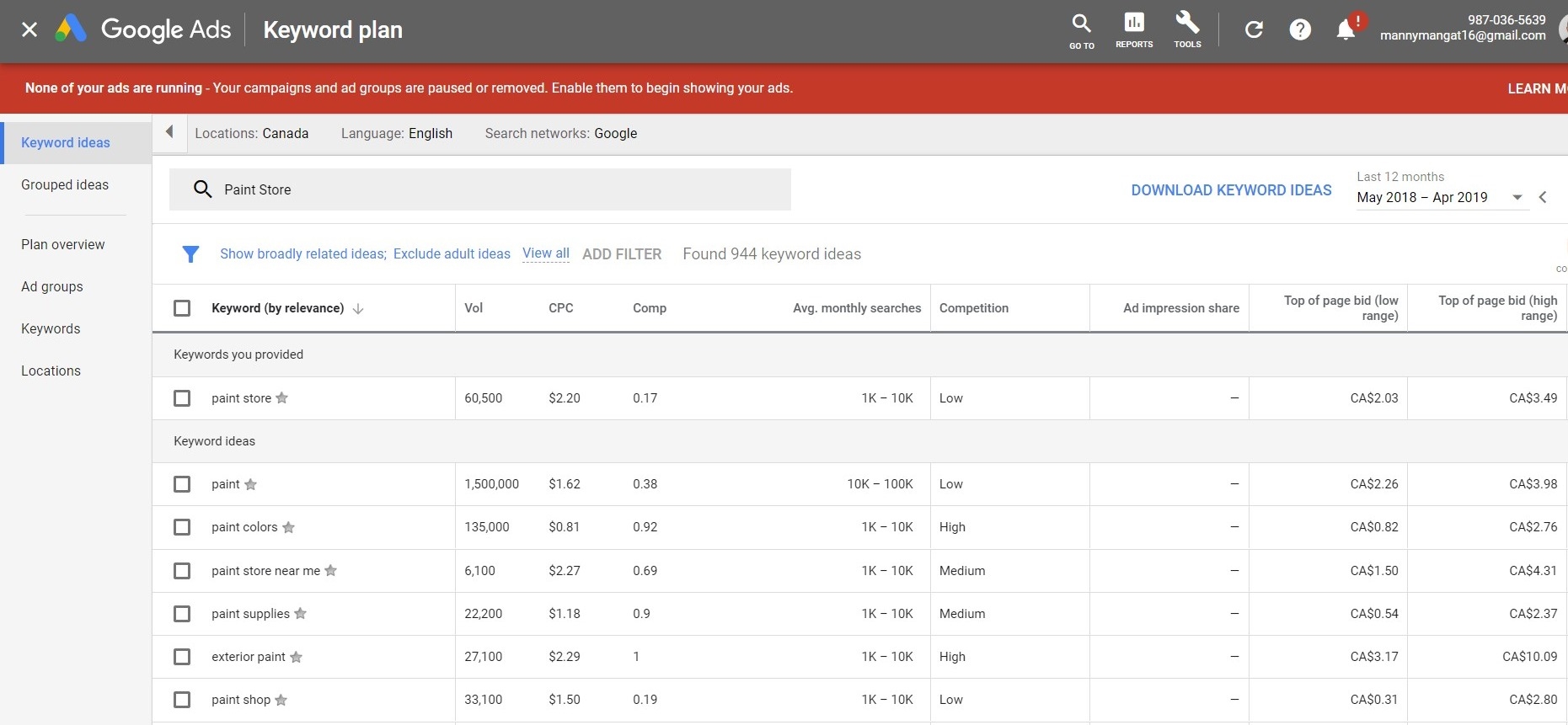
Look for keywords that have high search volumes and low to medium competition. These will be the keywords you want to target most. Unfortunately, unless you have an active spending Google AdWords account, you will see that your average monthly searches do no give you exact search numbers. You can see that Google shows you an estimate of the search between a select range of numbers. This won’t give you much to go on; however, there is a work-around.
Select the keywords you want by clicking on the box directly to their left and a drop down menu in blue will appear. From that new menu, click on the match type drop down window and select “Exact match.”
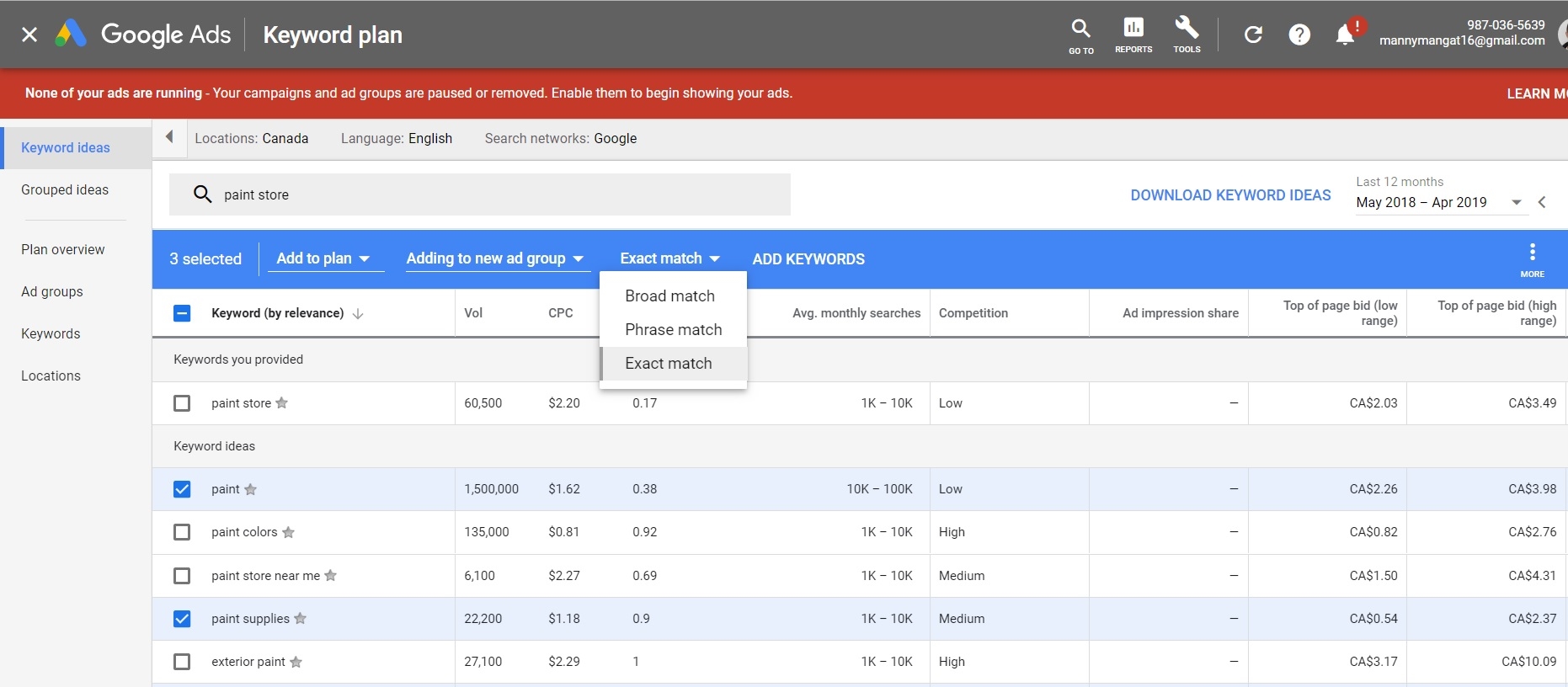
Now, select “Add to plan” from its drop down window (it’s selected by default) and click on “ADD KEYWORDS.” Head over to the keywords menu from the left column navigation.
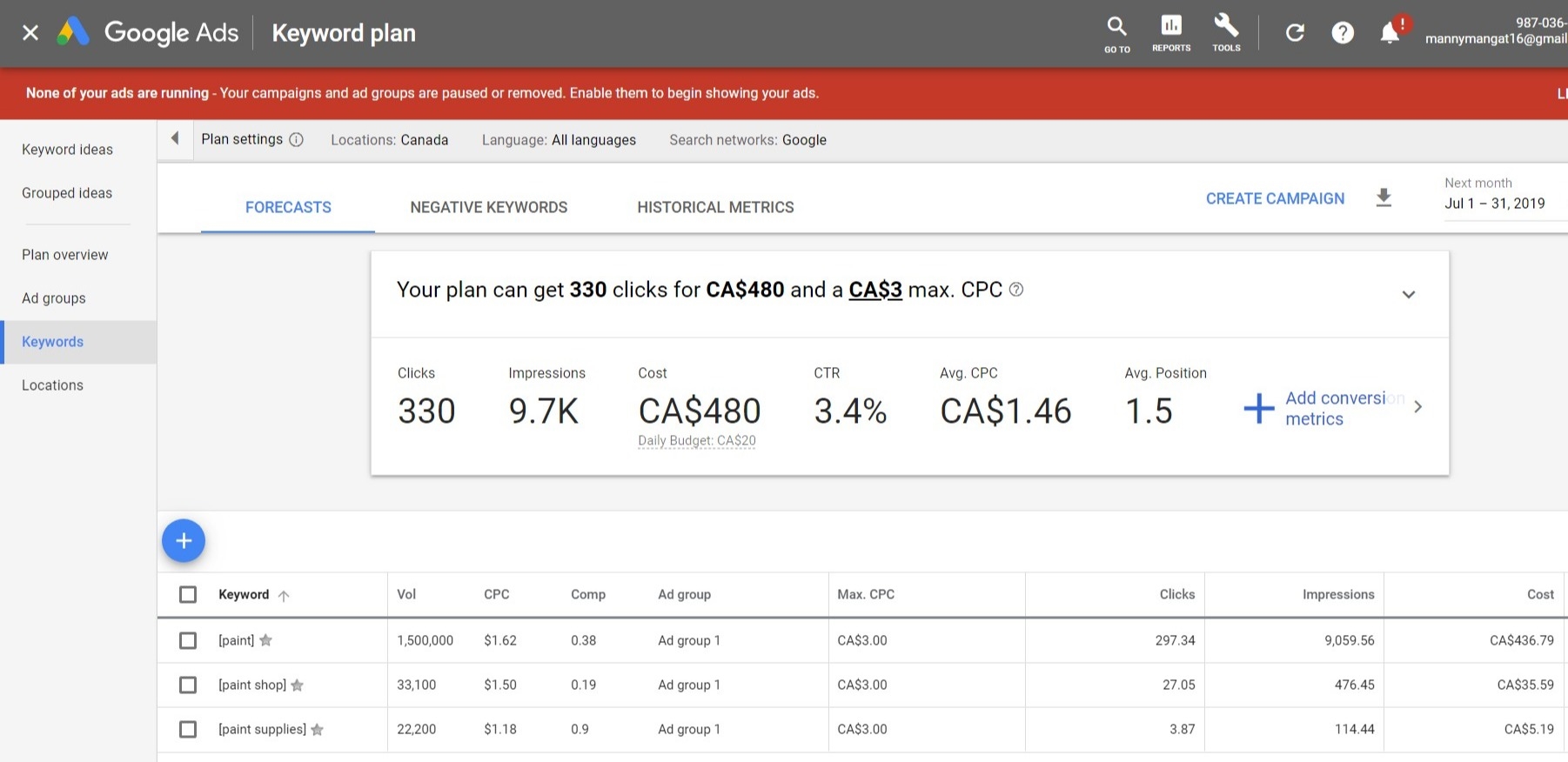
Now you can see exactly how many impressions and clicks each keywords gets. This will help inform which words you use in your titles.
Spend time looking for keywords that get a good mix of impressions and clicks. Also, don’t forget to calculate click-through rates (CTR) to find which keywords perform the best. You can learn a keyword’s CTR by dividing its number of impressions by its number of clicks.
Keyword research such as this can help your business find keyword and keyword phrase searches to create content around in order to increase your business’ traffic and, more importantly, better fulfill search intent.
Make Search Titles Accurate
Accuracy is very important when trying to make your page title compliant with Google Search satisfaction because it gives a clear expectation for your audience.
Understand your titles need to accurately reflect your content. One way to ensure accuracy is to add a division in your headline after you insert your focus keyword to better clarify your topic from your business.
There are four distinct ways in which you can better clarify the content of your headline: vertical lines, dashes, brackets and colons.
If you take a few minutes to look at the top search results, you’ll likely see they are short and clear about which topic they are writing to and subsequently use a division (in the form of the one of the four above) to separate the name of their business or the type of content.
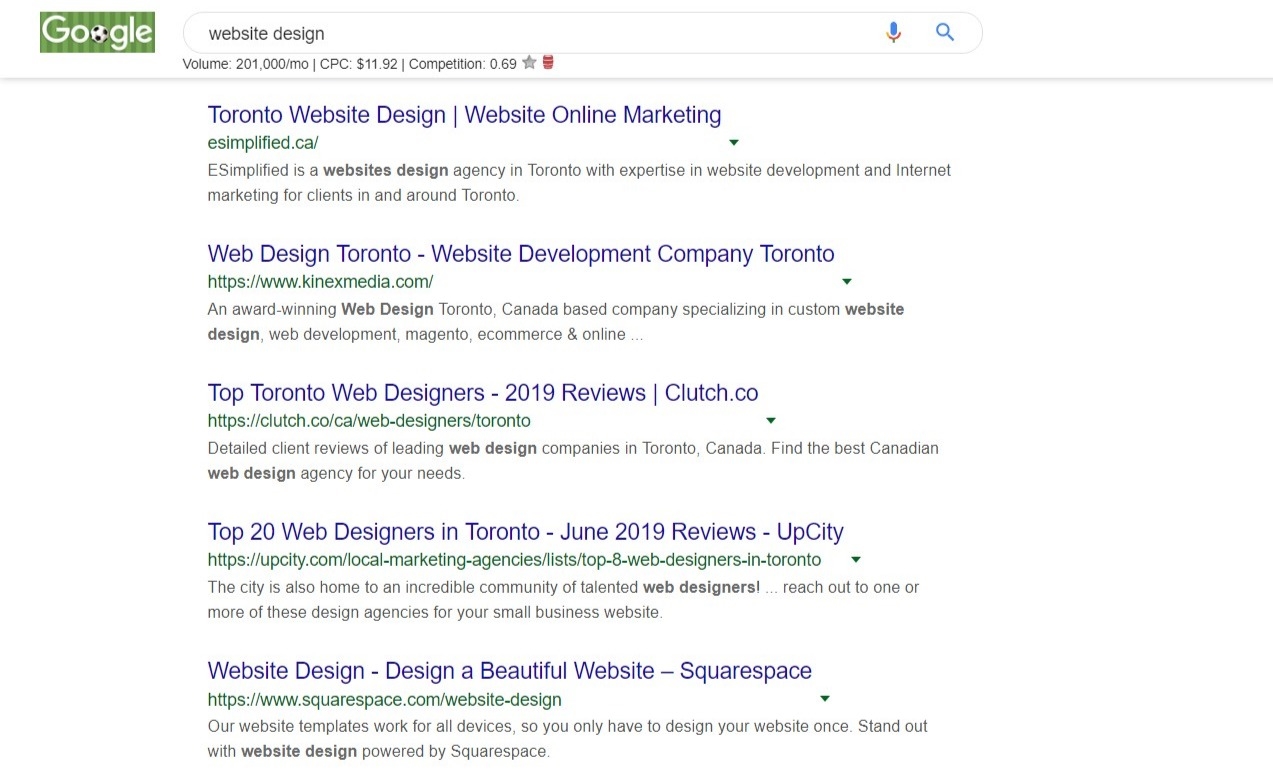
As you can see, every search result uses a form of division to indicate either what the content is, what form the content will take, which niche it belongs to, and which company its from.
It’s these kinds of headlines or titles with clarification, on average, that perform better than those without.
In addition, it’s all about setting high and clear expectations because readers will know exactly what they are getting themselves into before clicking.
Keep SEO Titles Precise
There are no clear rules as to how short or long a title should be. However, it depends on where it will appear and what your goals are.
For instance, if you want your post to rank high on search engines, then your title should have less than 70 characters. Optimizing your SEO titles for social sharing entails a different requirement.
However, titles between 8 and 12 words in length are believed to get the most social shares and likes on average. It’s therefore a good idea to run some tests to determine what exactly works better for your target audience on search and social.
Conclusion
If your plan is to get your business seen on Google Search, you need to be able to write titles its algorithm loves. Remember, to do this, all you need is some basic keyword research, content title divisions, and precise word choice.
Digital & Social Articles on Business 2 Community
(75)





